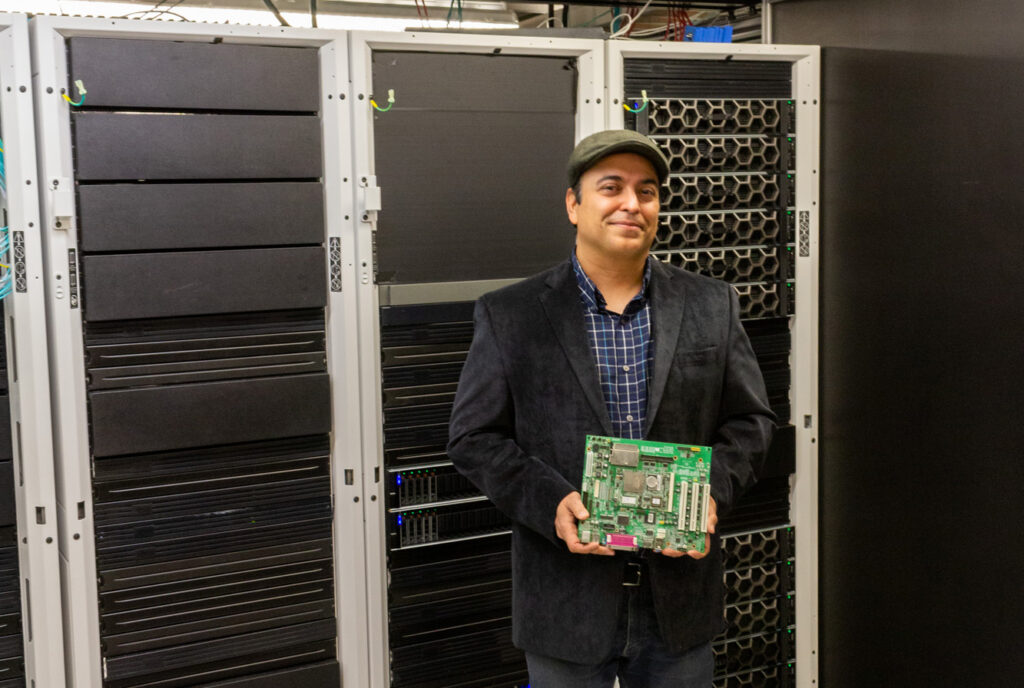
With the rise of artificial intelligence and the Internet of Things, our hyperconnected world relies on data – lots and lots of it.
Sudeep Pasricha, professor of Electrical and Computer Engineering at Colorado State University, is concerned about an often-overlooked aspect of our increasingly data-driven society: the environmental cost.
He has received funding from the National Science Foundation and Hewlett Packard Enterprise to lead research on sustainable serverless cloud computing. Pasricha is investigating environmental impacts across the entire technology lifecycle of power-hungry cloud data centers. These are the facilities that store and process massive amounts of data for social media, email, streaming services, and more.
Pasricha says the ecological footprint of our high-tech habits is staggering. He has been exploring energy efficient computing for nearly two decades at CSU, one of the most sustainable campuses in the world.
“I think people underestimate the environmental impact of computing,” said Pasricha. “It is estimated that our data systems are consuming 3% of global electricity, and that is predicted to increase to 4% in the near future.”
Using AI and machine learning to foster sustainable computing
Big data centers are also major contributors to global carbon emissions because they rely heavily on dirty energy sources like coal. These facilities devour untold gallons of water for cooling and generate harmful wastewater that seeps into local ecosystems.
But the problems don’t stop there. Pasricha, who was honored in 2020 for helping propel the digital age, said technology is causing a range of harmful impacts – from noxious gases released during semiconductor manufacturing to carbon emissions from long-haul transportation of electronics to groundwater and soil pollution caused by discarded electronic components.
“I believe smart electronics can make our lives better, but we have to look at the problem holistically to enjoy technology in a sustainable way,” he said.
Pasricha is developing algorithms that leverage AI and machine learning to manage growing computing demands, while reducing environmental impacts. His goal is to improve the proliferation of serverless cloud computing by making it more environmentally sustainable, cost-effective, and seamless to integrate into data-driven services that enrich our daily lives.
Pasricha’s intelligent algorithms are trained not only to monitor and optimize data centers around the world, but also to perform computations that reduce power consumption and waste across the entire technology lifecycle. Like human intelligence, these models can learn, think critically, and make decisions to help businesses identify inefficiencies and areas for improvement, from water use to end-of-life decommissioning.
Teaching environmental responsibility
The Department of Electrical and Computer Engineering is known for its cutting-edge educational and research programs in Data, Information, and Systems – one of five areas of research strength throughout the Walter Scott, Jr. College of Engineering.
Pasricha is engaging students in his mission to reduce the environmental impacts of technology by incorporating his research results into undergraduate and graduate courses, as well as K-12 outreach. He hopes his work will help pave the way to a thriving high-tech future that does not compromise the environment or human health.
“Solving the sustainability challenge of serverless cloud computing is key to enabling next-generation advancements with self-driving cars and IoT devices,” said Pasricha. “I’m excited to have the chance to make a positive impact for the future of our kids.”